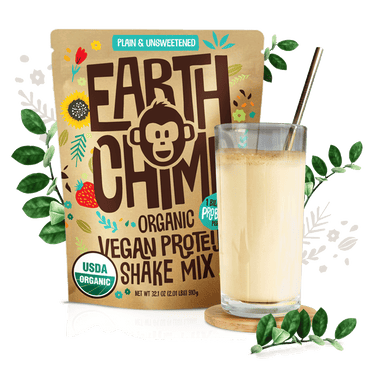Curious if vegan protein powder could lead to constipation? It's a common question with a not-so-simple answer. Protein powders, including the plant-based kinds, offer big benefits but react differently in everyone's gut. We're here to clear the air on this topic.
Protein powders come in all shapes and flavors, from animal-based like whey and casein to plant-powered ones from peas, rice, and more. Each type has its own perks, but it's how they play with your tummy that really matters.
So, buckle up! We're about to dive into the world of protein powders, exploring how they impact digestive health, the challenges some might face with animal-based proteins, and why plant-based options might just be the gentler choice for your gut. And remember, what works for someone else might not work for you, but finding that perfect protein powder match is definitely possible.
Digestive Health and Protein Powders
When we talk about protein powders, we're looking at a handy way to help our muscles grow and repair. They're great after a workout and can make us feel fuller, which might help us snack less. But, like any food or supplement, how they affect our tummy can really vary from person to person.
Why the Tummy Troubles?
You see, protein powders are processed foods. This means we need to keep an eye out for stuff like artificial ingredients and additives. These extras can sometimes upset our stomachs. Also, common allergens like gluten, soy, and dairy are found in some protein powders, and these can cause issues for some folks.
The Role of Fiber and Protein Types
The type of protein in the powder can make a difference too. Animal-based proteins, like whey, are super popular. They're really good at helping our muscles out after we exercise. But, they might not be everyone's cup of tea, especially if you're lactose intolerant or have a milk allergy.
Then there's the fiber to think about. Protein powders don't always have a lot of it, unlike whole foods. Fiber is super important for keeping things moving in our digestive system. So, if we're not careful, swapping too much real food for protein shakes might lead to constipation for some.
Challenges with Animal-Based Proteins
Sometimes, our bodies and animal-based proteins, like whey and casein, don't get along too well. It's not about pointing fingers, but it's good to know what might not sit right in our tummies.
Why Whey Might Not Be the Way
Whey protein comes from milk, and it's a big help after workouts. But, for some of us, dairy can be a bit of a troublemaker. If you've ever had a tough time with milk or cheese, whey might give you similar grief. It's all about how our bodies handle dairy. For those who are lactose intolerant or have a dairy allergy, whey could lead to discomfort, and yes, sometimes constipation.
Casein's Slow Pace
Casein is another milk protein that takes its time to digest. It's great for keeping you full, especially overnight. But, its slow nature means it might hang around longer than welcome for some, contributing to that bloated, uncomfortable feeling.
The Digestibility of Plant-Based Protein Powders

Switching gears to plant-based protein powders, there's a lot to smile about, especially when it comes to our bellies. These green champs come from plants like peas, brown rice, and hemp. They're not just for vegans; they're for anyone looking to give their tummy a smoother ride.
A Friend to Many Tummies
One big plus is that plant proteins are often easier on the stomach. Without dairy, they sidestep common issues like lactose intolerance. So, if dairy proteins have ever given you a hard time, plant-based powders might just be your new best friend.
Mixing It Up for Complete Nutrition
Now, plant proteins sometimes need a little help to get all those essential amino acids our bodies crave. That's why many powders mix different plant sources together. It's like a team where everyone brings something special to the table, helping to provide a variety of nutrients that might support your muscles.
Plant-based protein powders are not just about being kind to the planet; they're often kinder to our tummies too. They bring a lot to the table, from being dairy-free to offering a blend of proteins that aim to keep our muscles happy and our digestive system running smoothly.
Individual Variability and Plant Proteins
Now, let's get personal. Even with all the good stuff about plant-based protein powders, how they sit with you can be pretty unique. It's all about finding what fits just right.
Not One-Size-Fits-All
Just like our taste in music or movies, our bodies react to foods in their own way. Some of us might find that certain plant proteins, like pea or soy, are just what we needed. Others might notice they don't feel as great and need to try something different. It's all normal.
Listening and Learning
The key is to listen to your body. Starting with small amounts of a new protein powder can help you figure out how you feel. It's like dipping your toes in the water before diving in. If your tummy isn't happy, it might be time to try a different plant-based option.
Finding your perfect match in plant-based protein powders might take a little trial and error, and that's okay. What's important is that you're giving your body what it needs to feel good and stay healthy.
Dietary Recommendations to Prevent Constipation

Eating right is key to avoiding constipation. What you eat can really affect how you feel.
Increase Your Fiber Intake
Fiber is like a broom for your intestines. It helps keep things moving. Eating more fruits, vegetables, and whole grains is a great way to get more fiber. Foods like peas, apples, and oatmeal are good choices.
Stay Hydrated
Drinking enough water is also super important. Water helps fiber do its job better. Try to drink 8-10 cups of water a day. This can keep your digestion smooth.
Don't Forget to Move
Exercise helps your body stay regular, too. Even a short walk each day can make a big difference. Movement gets your intestines moving as well.
With these easy tips, you can help keep constipation away. Eating foods high in fiber, drinking plenty of water, and staying active are all good steps. This way, you can enjoy the benefits of protein powders without worry.
When to Consult a Healthcare Professional
While adding vegan protein powder to your diet is a positive step for many, it's important to remember that everyone's body is different. If you're experiencing digestive discomfort, or if you have specific health concerns, reaching out to a healthcare professional is a smart move.
Here are a few situations where getting advice from a doctor or dietitian can help:
- If you have ongoing digestive issues. A healthcare provider can help pinpoint the cause and suggest dietary adjustments or treatments.
- Before making significant changes to your diet. Especially if you have health conditions like allergies, diabetes, or heart disease.
- If you're not sure which protein powder is right for you. A professional can offer guidance based on your nutritional needs and health goals.
Remember, consulting a healthcare professional can provide personalized advice to ensure that your dietary choices support your overall health and wellness journey.
Final Thoughts: Why EarthChimp is a Smart Addition to Your Nutrition Plan

In wrapping up our chat on vegan protein powders and digestive health, it's clear that the right choices can lead to a happy gut. Making informed decisions about what you include in your diet is crucial, especially when considering your digestive comfort and overall well-being.
EarthChimp Organic Vegan Protein Powder could be a suitable option for those interested in exploring plant-based proteins, aiming to minimize digestive discomfort. With its 100% organic, vegan blend of pea, pumpkin, sunflower, and coconut proteins, EarthChimp is crafted to nourish your body while being kind to your stomach.
Its formula is free from common irritants like artificial flavorings, GMOs, added sugars, and gluten, and it even includes probiotics to support your digestive health.
With EarthChimp, you're adding a plant-based choice to your diet, supporting your nutritional goals. Let's make each meal a step towards wellness.
FAQ: Navigating the World of Vegan Protein Powders
What makes a good protein source in vegan powders?
A great protein source in vegan powders often comes from a blend of plant-based proteins, like pea, brown rice, and hemp. This mix helps ensure you get a complete amino acid profile, similar to animal proteins, but without any dairy or gluten.
Can switching to vegan protein powders improve digestion?
Yes, some people find that plant-based protein sources are easier on their digestion compared to animal-based ones. This is because they're often free from lactose and other common allergens that can cause digestive issues.
How can I supplement my protein intake with vegan powders?
Adding vegan protein powder to smoothies is a popular and convenient way to supplement your protein intake. It's a versatile option that can also be used in baking or as a meal replacement.
Are all vegan protein powders complete in amino acids?
Not all plant proteins on their own offer a complete amino acid profile, but many vegan protein powders blend different plant sources to ensure you get all essential amino acids, making them complete.
What should I look for when choosing a vegan protein powder?
Look for powders with minimal ingredients, no added sugars or artificial flavors, and that offer a significant amount of protein per serving. Also, check for third-party testing to ensure product safety.
References:
- https://www.medicalnewstoday.com/articles/323093
- https://www.healthline.com/nutrition/is-powder-bad-for-you#bottom-line
- https://www.verywellfit.com/animal-based-protein-powder-types-and-benefits-5525492
- https://health.clevelandclinic.org/do-i-need-to-worry-about-eating-complete-proteins
Disclaimer:
This statement has not been evaluated by the Food and Drug Administration. This product is not intended to diagnose, treat, cure, or prevent any disease.















